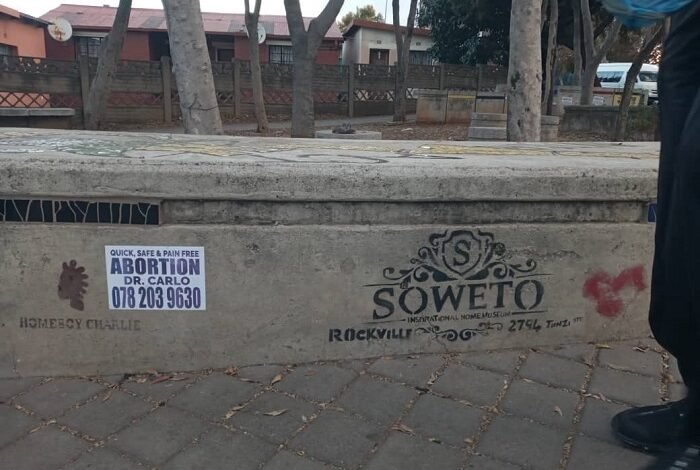SOWETO, where everything goes

It was a cultural shock of my life to see an unorthodox birth control poster overtly in SOWETO, the black settlement in South Africa, which reads “Quick, Safe & Pain free Abortion call Dr Carlo 0782039630”.
Indeed, coming from Ghana where our lives are heavily influenced and shaped by socio-cultural-religious principles and values, I thought it was same elsewhere, but only to discover that in Soweto everything goes.
My recent trip to South Africa on an official assignment at the Pan-African Parliament, in Midrand, Johannesburg drew curiosity to visit the SOWETO community and seeing the poster, the adage “One man’s meat is another man’s poison” crossed my mind.
Abortion is abhorrent, disgusting and “poisonous” to us in Ghana, but in SOWETO, it is “meat.”
Of course, I was in a different setting so I had to contain and quickly build a shock absorber within me to withstand the impact of the poster on me.
I recall the powerful lyrics of the legendary late Nigeria Musician, Sonny Okusun’s “There is fire in Soweto, burning all my people, Now there is fire in Angola, burning all my people…” which chronicles the plight of the black people in Africa.
He composed the song in the ‘70s to campaign against and attack the perpetrators of the obnoxious apartheid regime in South Africa and other parts of continent.
The influential lyrics added momentum and contributed to the liberation struggle on the Africa continent, which eventually led to the independence of the continent from colonial rule and the total abolition of infamous and obnoxious apartheid regime in South Africa, with the release of Nelson Mandela from the Robben Island prison on February 11, 1990 and return to democratic and majority rule in 1994, after over three centuries of colonial and apartheid rule, where the minority white solely had grip over power.
On the flipside, if Sonny Okusun were alive to continue with his liberation struggle lyrics, though the African continent is now totally liberated, his next liberation lyric will look like “There is fire in Soweto, killing all the foetus…” to highlight the unorthodox birth control business of Dr Carlo in post-apartheid Soweto.
Soweto, is an acronym of SOUTH-WESTERN TOWNSHIPS (SOWETO), to depict its geographical location in Johannesburg in Gauteng, one of the nine provinces of South Africa.
The black settlement grew from a collection of shanty towns and slums, the residents being hewers of wood and drawers of water during the erstwhile obnoxious apartheid regime.
Like any other community, Soweto exhibits all the good, the bad and the ugly. Certainly, Dr Carlo’s overt poster is the bad and ugly side of the community, from my own estimation and hailing from another socio-cultural-religious setting.
The embellished houses of nationalist leader and first black post-apartheid President of South Africa, Nelson Mandela and Archbishop Desmond Tutu, the Anglican Bishop and anti-apartheid and human rights activist, both late are enough to draw tourists to this buzzing community.
So is the Sakhumzi Restaurant, on the popular and busy Vilakazi Street of SOWETO, which had its origin from a shady tree in the house of Sakhumzi Maqueba, where the residents in the community gathered to while away time, is now a buzzing eatery attracting hundreds of tourists from across the globe, who throng there to have fun and experience life in SOWETO.
Photographing in the community is big business as the “area boys” are ever ready with their sharp lenses to give you a good one for your memorable album. The warm hospitality of the baritone voice “Welcome to Soweto, Welcome to Soweto….” from the “area boys” marks your first experience of “direct taxation” from the community.
The emotional sight of the relics of pair of sandals of the school children gunned down by the oppressive apartheid regime during series of uprising in the community in 1979, over the imposition of the Afrikaans, deemed as the language of the oppressors, are still visibly hanged on the walls, like old second-hand dealer advertising his wares for sale.
Indeed, the SOUTH-WESTERN TOWNSHIP is truly a place to visit, it’s a lively community and the memorable tourist sites make the place a must-go area for tourism and hospitality, the backbone of the SOWETO economy. A lot to learn and experience in a life time.
But make no mistake, the adventurous ones reading my article, don’t dare make that call to Dr Carlo for that unholy appointment; you either save and protect the foetus or not conceive it!!
“
The black settlement grew from a collection of shanty towns and slums, the residents being hewers of wood and drawers of water during the erstwhile obnoxious apartheid regime.
“
BY ALHAJI SALIFU ABDUL-RAHAMAN





